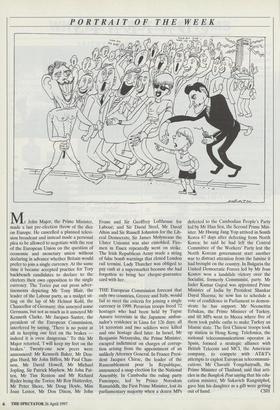PORTRAIT OF THE WEEK
Mr John Major, the Prime Minister, made a last pre-election throw of the dice on Europe. He cancelled a planned televi- sion broadcast and instead made a personal plea to be allowed to negotiate with the rest of the European Union on the question of economic and monetary union without declaring in advance whether Britain would prefer to join a single currency. At the same time it became accepted practice for Tory backbench candidates to declare to the electors their own opposition to the single currency. The Tories put out press adver- tisements depicting Mr Tony Blair, the leader of the Labour party, as a midget sit- ting on the lap of Mr Helmut Kohl, the Chancellor of Germany; this annoyed some Germans, but not as much as it annoyed Mr Kenneth Clarke. Mr Jacques Santer, the president of the European Commission, interfered by saying, 'There is no point at all in keeping our feet on the brakes indeed it is even dangerous.' To this Mr Major retorted, 'I will keep my feet on the brakes.' Twenty-one new peers were announced: Mr Kenneth Baker, Mr Dou- glas Hurd, Mr John Biffen, Mr Paul Chan- non, Mr David Howell, Mr Michael Jopling, Sir Patrick Mayhew, Mr John Pat- ten, Mr Tim Renton and Mr Richard Ryder being the Tories; Mr Roy Hattersley, Mr Peter Shore, Mr Doug Hoyle, Miss Joan Lestor, Mr Don Dixon, Mr John Evans and Sir Geoffrey Lofthouse for Labour, and Sir David Steel, Mr David Alton and Sir Russell Johnston for the Lib- eral Democrats; Sir James Molyneaux the Ulster Unionist was also ennobled. Fire- men in Essex repeatedly went on strike. The Irish Republican Army made a string of false bomb warnings that closed London rail termini. Lady Thatcher was obliged to pay cash at a supermarket because she had forgotten to bring her cheque-guarantee card with her.
THE European Commission forecast that only two countries, Greece and Italy, would fail to meet the criteria for joining a single currency in 1999. Peruvian troops freed 72 hostages who had been held by Tupac Amaru terrorists in the Japanese ambas- sador's residence in Lima for 126 days; all 14 terrorists and two soldiers were killed and one hostage died later. In Israel, Mr Benjamin Netanyahu, the Prime Minister, escaped indictment on charges of corrup- tion arising from the appointment of an unlikely Attorney General. In France Presi- dent Jacques Chirac, the leader of the Rassemblement pour la Republique, announced a snap election for the National Assembly. In Cambodia the ruling party Funcinpec, led by Prince Norodom Ranariddh, the First Prime Minister, lost its parliamentary majority when a dozen MPs defected to the Cambodian People's Party led by Mr Hun Sen, the Second Prime Min- ister. Mr Hwang Jang Yop arrived in South Korea 67 days after defecting from North Korea; he said he had left the Central Committee of the Workers' Party lest the North Korean government start another war to distract attention from the famine it had brought on the country. In Bulgaria the United Democratic Forces led by Mr Ivan Kostov won a landslide victory over the Socialist, formerly Communist, party. Mr Inder Kumar Gujral was appointed Prime Minister of India by President Shankar Dayal Sharma; he now has to schedule a vote of confidence in Parliament to demon- strate he has support. Mr Necmettin Erbakan, the Prime Minister of Turkey, and 60 MPs went to Mecca where five of them took public oaths to make Turkey an Islamic state. The first Chinese troops took up station in Hong Kong. Telefonica, the national telecommunications operator in Spain, formed a strategic alliance with British Telecom and MCI, the American company, to compete with AT&rs attempts to exploit European telecommuni- cations. Mr Chavalit Yongchaiyudh, the Prime Minister of Thailand, said that arti- cles in the Bangkok Post saying that his edu- cation minister, Mr Sukavich Rangsitphol, gave him his daughter as a gift were getting


































































 Previous page
Previous page